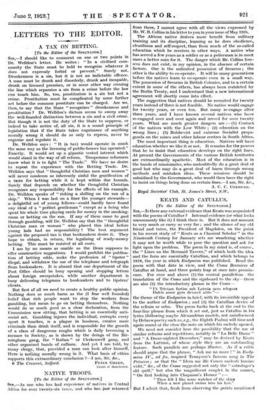LETTERS TO THE EDITOR.
A TAX ON BETTING.
[To the Editor of the SPECTATOR.] SIR,—I should like to comment on one or two points in Dr. Welldon's letter. He writes : " In a civilized com- munity the State must be held to recognize whatever it does not expressly forbid or prevent." Surely not. Drunkenness is a sin, but it is not an indictable offence. A man must be drunk and disorderly, drunk and incapable, drunk on licensed premises, or in some other way crossing the line which separates a sin from a crime before the law can touch him. So, too, prostitution is a sin but not a crime. Prostitution must be complicated by some further act before the common prostitute can be charged. Are we, then, to say that the State " recognizes " drunkenness and prostitution ? Dr. Welldon's dictum seems to sweep away the well-founded distinction between a sin and a civil crime. But though it is not the duty of the State to suppress, or indeed to take notice of, all sin, it is a sound principle of legislation that if the State takes cognizance of anything morally wrong it should do so only to repress, never to organize and regulate it.
Dr. Welldon says : " It (a tax) would operate in much the same way as the licensing of public-houses has operated." Exactly. It would set up a gigantic vested interest which would stand in the way of all reform. Temperance reformers know what it is to fight " The Trade." We have no desire to repeat the experience with the Betting Trade. Dr. Welldon says that " thoughtful Christian men and women " will never condemn as inherently sinful the gratification of a taste for betting while it is kept within due bounds. Surely that depends on whether the thoughtful Christian recognizes any responsibility for the effects of his example. Dr. Welldon speaks of " risking a shilling on the run of a ship." When I was last on a liner the younger stewards— a delightful set of young fellows—could hardly have found any ideal of a " perfect gentleman " except as a being who spent his whole time playing cards for money in the smoking- room or betting on the run. If any of them came to gaol through gambling, will Dr. Welldon say that the " thoughtful Christian man or woman " who placed this ideal before young lads had no responsibility ? The best argument -against the proposed tax is that bookmakers desire it. They hope to obtain, in return, the legalizing of ready-money betting. This must be resisted at all costs.
I am by no means as unable as the Dean supposes to offer constructive suggestions. I would prohibit the publica- tion of betting odds, make the profession of " tipster " -illegal, and withdraw the use of the telephone and telegraph .frow bookmakers. It is absurd that one department of the Post Office should be busy opening and stopping letters about foreign sweepstakes, while another department is busy delivering telegrams to bookmakers and to tipsters' clients.
But first of all we need to create a healthy public opinion. Nothing does so much harm as the (I fear well founded) -belief that rich people want to stop the workers from .gambling, but mean to go on betting themselves. Nothing would do so much good as a clear declaration, from the Commission now sitting, that betting is an essentially anti- social act. Gambling injures the individual, corrupts every sport it touches, is a plague in business, creates more criminals than drink itself, and is responsible for the growth of a class of dangerous roughs which is daily becoming a menace to Society, as is shown by the doings of the Bir- mingham gang, the " Italian " or Clerkenwell gang, and other organized bands of ruffians. And yet I am told, by many clergy, that, provided a man can look after himself, there is nothing morally wrong in it. What basis of ethics supports this extraordinary conclusion ?—I am, Sir, &c.,
Canon of Manchester.










































 Previous page
Previous page